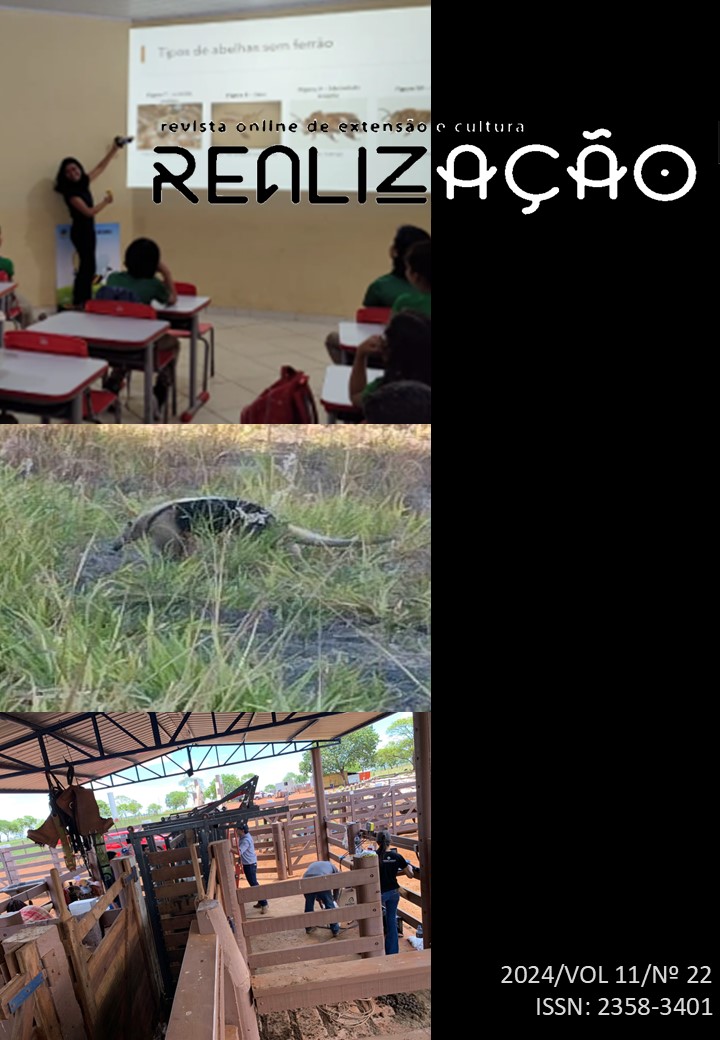Remote education in high school: subjective and linguistic impacts from the imposition of technological tools during the Covid-19 pandemic.
DOI:
https://doi.org/10.30612/realizacao.v11i22.19204Keywords:
Teenager, Education, PsychologyAbstract
This article presents the results of a master's research study that investigated the subjective and linguistic effects of technology-mediated education, imposed by the COVID-19 pandemic, on high school students. The research was motivated by concerns that emerged in the clinical context, where adolescents were grappling with personal transformations and typical developmental anxieties. With the closure of schools and the forced migration to digital platforms, the challenges of promoting effective education in a virtual environment became evident.The study, conducted with students from the Federal Institute of Education, Science and Technology of Mato Grosso (IFMT), employed a qualitative approach and was grounded in Freud-Lacanian psychoanalysis. Data collection included four weekly group workshops and individual semi-structured interviews with the participants. Data analysis was carried out using discourse analysis methodology, which allows for the investigation of the meanings produced by the statements of adolescents regarding technology-mediated education during a pandemic. The research revealed how adolescents articulated their suffering and coped with the psychological impacts caused by the abrupt changes in the teaching format. Through a psychoanalytic listening approach, it was possible to understand the relationship between language, subjectivity, and the discomfort generated by the new educational reality.The results indicate that the discourse of adolescents reflects the tensions between language and the underlying ideologies of the pandemic context, highlighting how technology has influenced their experiences and their ways of coping with the emotional and educational challenges imposed by the crisis.
Downloads
References
ALBERTI, S. Esse sujeito adolescente. Rio de Janeiro: Rios Ambiciosos, 1996.
ANZIEU, D. (1993). O grupo e o inconsciente (o imaginário grupal). São Paulo, SP: Casa do Psicólogo.
BOURDIEU, P. A Miséria do Mundo. Petrópolis: Vozes, 4a ed., 1997.
CALLIGARIS, C. A adolescência. São Paulo: Publifolha, 2000.
COIMBRA, C. M. B. As funções da instituição escolar: análises e reflexões. Psicologia: ciência e profissão, 1989. DOI: https://doi.org/10.1590/S1414-98931989000300006
COUTINHO, L, G. A adolescência e a errância, destinos de laço social contemporâneo. NAU. 2009.
DOLTO, F. A cauda dos Adolescentes, 2004. Tradução: Orlando dos Reis, Edit. Ideias e Letras 2ed,287p. São Paulo 2004.
DUNKER, C.; PAULON, S. S.; RAMO, M. A. A psicologia na educação: práticas e desafios. 1. ed. São Paulo: Editora UNESP, 2016.
GOLDSMID, R; FÉRES-CARNEIRO, T. A função fraterna e as vicissitudes de ter e ser um irmão. Psicologia em Revista, Belo Horizonte, v. 13, n. 2, p. 293-308, dez. 2007.
GUIRADO, M. A análise Institucional do Discurso como Analítica da Subjetividade. Tese (LivreDocência – Departamento de Psicologia da Aprendizagem, do Desenvolvimento e da Personalidade – Instituto de Psicologia da Universidade de São Paulo). São Paulo: 2009. 316 p.
HALLIGAN, Peter; PHILIPS, Judith. The psychology of emotion: a reader. New York: Wiley-Blackwell, 201
HAN, B. Do Desaparecimento dos Rituais uma topologia do presente. Tradução de Gabriel Salvi Philipson. Petrópolis: Vozes, 2021.
RILKE, Rainer Maria. Cartas a um jovem poeta. São Paulo: Companhia das Letras, 2020.
ORGANIZAÇÃO DAS NAÇÕES UNIDAS PARA A EDUCAÇÃO, A CIÊNCIA E A CULTURA (UNICEF). Covid-19: Mais de 95% das crianças estão fora da escola na América Latina e no Caribe, estima o UNICEF. Panamá: 2020.
Parecer CNE/CP nº 5/2020, de 01 de junho de 2020, dispõe sobre diretrizes para orientar escolas da educação básica e instituições de ensino superior durante a pandemia do COVID-19.
PÉREZ GOMEZ, A. I. A cultura escolar na sociedade neoliberal. Porto Alegre: Artmed, 2001.
SMYTH, B., MOLONEY, L., BRADY, J., HARMAN, J. J., & ESLER, M. COVID-19 and separated families (COVID-19 Issues Paper). Australian National University. 2020.
Downloads
Published
How to Cite
Issue
Section
License
Copyright (c) 2024 Midiã Pires, Henrique de Oliveira Lee

This work is licensed under a Creative Commons Attribution-NonCommercial-ShareAlike 4.0 International License.
Autores que publicam nesta revista aceitam as normas de publicação, bem como, concordam com os seguintes termos:
(a) O Conselho Editorial se reserva ao direito de efetuar, nos originais, alterações da Língua portuguesa para se manter o padrão culto da língua, respeitando, porém, o estilo dos autores.
(b) Autores mantêm os direitos autorais e concedem à revista o direito de primeira publicação, com o trabalho simultaneamente licenciado sob a Creative Commons Atribuição-NãoComercial-CompartilhaIgual 4.0 Internacional que permite: Compartilhar — copiar e redistribuir o material em qualquer suporte ou formato e Adaptar — remixar, transformar, e criar a partir do material. A Creative Commons Atribuição-NãoComercial-CompartilhaIgual 4.0 Internacional considera os termos seguintes:
- Atribuição — Você deve dar o crédito apropriado, prover um link para a licença e indicar se mudanças foram feitas. Você deve fazê-lo em qualquer circunstância razoável, mas de nenhuma maneira que sugira que o licenciante apoia você ou o seu uso.
- NãoComercial — Você não pode usar o material para fins comerciais.
- CompartilhaIgual — Se você remixar, transformar, ou criar a partir do material, tem de distribuir as suas contribuições sob a mesma licença que o original.
- Sem restrições adicionais — Você não pode aplicar termos jurídicos ou medidas de caráter tecnológico que restrinjam legalmente outros de fazerem algo que a licença permita.


